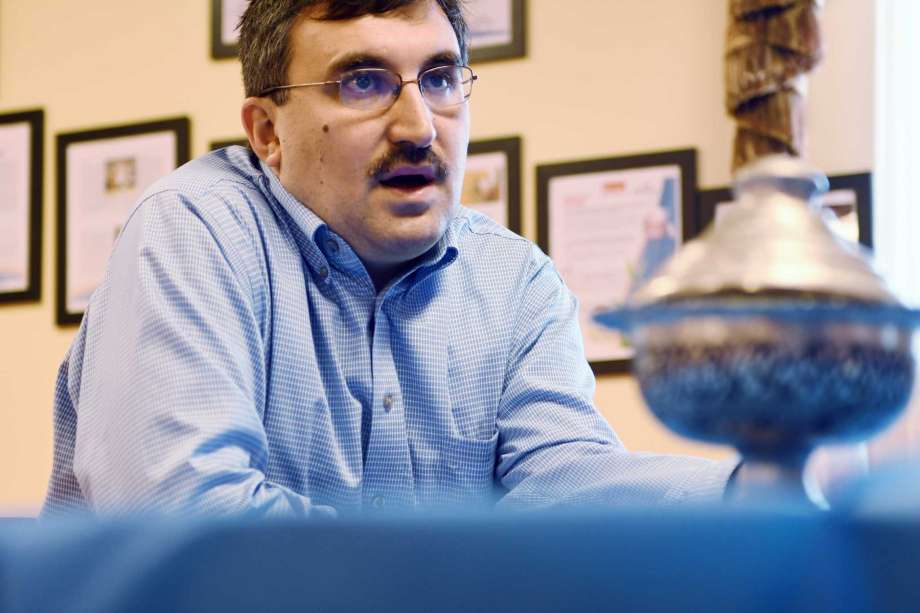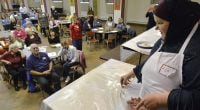Crackdown in Turkey felt in Capital Region

Date posted: September 28, 2017
Paul Grondahl
My heart broke Thursday night at the end of a lovely dinner of Turkish cuisine when our hosts told us they were shutting down the Turkish Cultural Center of Albany and putting the building up for sale.
“People are too afraid to come here anymore,” said Veysel Ucan, who opened the center in 2009 on Broadway in Menands and served as its executive director until recently. He led an annual cultural tour of Turkey for state legislators, teachers and dozens of local residents. My daughter, Caroline, and I joined Ucan and a group of eight travelers in the summer of 2015 to Turkey.
“It’s been a terrible situation in Turkey since the coup attempt and it’s getting worse,” said immigration attorney Seth Leech, a partner with the Albany law firm of Whiteman, Osterman & Hanna. His caseload has exploded in the past year. Leech receives several inquiries each week from professors, business owners and white-collar professionals in Turkey who were arrested, fired or blacklisted in Erdogan’s purge.
On Thursday night, Ucan reported the cause of death: guilt by association. They were under surveillance, informed upon by neighbors and acquaintances to a repressive autocratic regime in the Turkish capital of Ankara, bent on vengeance.
It was a cautionary tale about the insidious nature of fear and intimidation from thousands of miles away in the age of the internet, with the specter of retribution hanging over their families in Turkey. I was reminded of Edmund Burke, who wrote: “The only thing necessary for the triumph of evil is for good men to do nothing.”
I met Ucan in 2009 and attended several of the center’s programs over the years. The members I met were gentle souls, kind and unfailingly warm and generous hosts. We drank Turkish black tea in small ornate glasses. Women served baklava made of honey and pistachios. Little children ran around the building, trailing laughter all the way.
“The Erdogan purge started out as a witch hunt and has now taken on a life of its own,” said Vera Eccarius-Kelly, professor of comparative politics at Siena College. “Anyone who was fired or arrested or branded an enemy of the state is marked forever. It has destroyed the lives of tens of thousands of Turkish families. Unfortunately, the fear and intimidation caused by this autocratic regime reached all the way to Albany.”
Volunteers at the Turkish Cultural Center of Albany offered Turkish language and cooking classes, invited the public to Ramadan friendship dinners and sought to build a bridge between East and West by leading a dialogue between Muslims and non-Muslims. They were research scientists, professors, graduate students, state employees and restaurant owners — among an estimated 250 Turkish families who live in the Capital Region.
The local Turkish community remains torn by an ongoing purge after a failed military-led coup in July 2016 against Turkey’s President Recep Tayyip Erdogan. The Erdogan regime targeted anyone with ties to Muslim cleric Fethullah Gulen, who lives in self-imposed exile in Saylorsburg, Pa. Erdogan accused Gulen of organizing the coup, in which 290 people were killed and more than 1,400 were injured. Gulen has repeatedly denied involvement.
Gulen and Erdogan, former allies, had a bitter falling out in 2013 over a government corruption investigation. Gulen, 76, who is in failing health, has lived in the Pocono Mountains since 2009. U.S. officials refused Erdogan’s demands that Gulen be extradited to Turkey because of insufficient evidence for extradition.
The Turkish Cultural Center of Albany is part of a large American network that includes nine similar centers across New York state. All have ties to Gulen. Erdogan has labeled Gulen an enemy of the state and claims he runs a terrorist organization. Gulen and his followers vehemently deny the accusations. They call their movement hizmet, or service. They feed the poor and operated schools and colleges across Turkey. We visited a few. Erdogan shut them down.
After the failed coup, Erdogan retaliated and worked to dismantle the hizmet movement. More than 150,000 people in Turkey were detained, arrested or fired from their jobs: police, military, judges, journalists and academics. Many were followers of Gulen. Others had written articles critical of Erdogan or posted negative comments on social media. More than 180 news outlets that wrote critically of Erdogan’s policies were shut down in the past year. Human Rights Watch issued a scathing report that called Turkey the world’s worst violator of press freedoms. Six months after we visited Today’s Zaman, Turkey’s largest English-language newspaper, Erdogan’s troops seized the paper and dispersed a group of protesters with tear gas, rubber bullets and water cannons. Reporters and editors we met fled into exile.
“It’s been a terrible situation in Turkey since the coup attempt and it’s getting worse,” said immigration attorney Seth Leech, a partner with the Albany law firm of Whiteman, Osterman & Hanna. He has specialized in immigration law since 1995. His caseload has exploded in the past year and the law firm now has six attorneys, seven paralegals and five support staff in its immigration practice.
Leech receives several inquiries each week from professors, business owners and white-collar professionals in Turkey who were arrested, fired or blacklisted in Erdogan’s purge. They cannot leave the country after their passports were revoked or seized at Turkish airports. Some have begun sneaking across the border to Greece or Bulgaria and fly to the United States on their Turkish passports. The wait for asylum applications in the U.S. can be up to three years and backlogs throughout the immigration process are the worst Leech has seen in 25 years.
“The Erdogan purge started out as a witch hunt and has now taken on a life of its own,” said Vera Eccarius-Kelly, professor of comparative politics at Siena College, who made several trips to Turkey for her research on Kurdish refugees. “Anyone who was fired or arrested or branded an enemy of the state is marked forever. It has destroyed the lives of tens of thousands of Turkish families. Unfortunately, the fear and intimidation caused by this autocratic regime reached all the way to Albany.”
There was an awkward silence at the end of Thursday’s dinner. It felt like a wake. It brought to mind the words of another philosopher, Prince, who sang: “This is what it sounds like when doves cry.”
Paul Grondahl is the director of the New York State Writers Institute and a former Times Union reporter.
Source: Times Unioin , September 27, 2017
Tags: Dialogue | North America | Persecution of Hizmet by Erdogan | USA |
























